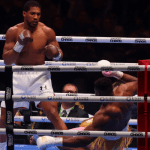France is voting in one of its most significant elections in years, with the far right hoping for a historic victory, but with political stalemate the more likely result.
This is the first time the anti-immigration National Rally (RN) of Marine Le Pen and Jordan Bardella has had a realistic chance of running the government and taking outright control of the National Assembly.
But after the RN’s first-round victory last Sunday, more than 200 rival candidates dropped out to give others a better chance of defeating the far right.
Voting ends at 20:00 (18:00 GMT) and by midday turnout was 26.63%, marginally up on the first round and the highest figure in a parliamentary vote since 1981.
Whatever the result, it is difficult to see President Emmanuel Macron coming out of this well.
Four weeks ago, he said it was the responsible solution to call a snap vote in response to the RN’s victory in European elections, minutes after the party’s 28-year-old leader Jordan Bardella challenged him to do so.
It is not yet clear if there will be another presidential address after the exit polls come out when voting ends on Sunday evening.
The two-round election came as a shock to a country gearing up for the start of the Paris Olympics on 26 July. Security was already tight and now 30,000 police have been deployed for a period of heightened political tension.
There are fears of violence in Paris and other French cities, whatever the outcome of the vote, and a planned protest outside the National Assembly on Sunday evening has been banned.
In Dreux, a historic old town on the road to Normandy, Sunday’s vote fell on the day the Olympic flame was passing through. “For us it’s a massive thing, bigger than the election,” says Pauline in the tourist office.
The flame has been travelling around France for almost two months, and Dreux is holding a weekend of festivities to mark its arrival.
On the beat in Dreux, where the Olympic arrived on the day of the election
Veteran commentator Nicolas Baverez believes the president has not just blown up his term in office and opened the gates of power wide for the far right. “He’s compromised the running of the Paris 2024 Olympics, which could deliver a final blow to France’s credit and its image,” he wrote in Le Point on the eve of the vote.
The constituency that includes Dreux is one of the races to watch in the second round of this election.
Candidates such as Marine Le Pen and Jordan Bardella have already won their seats, by winning more than half the vote. But another 500 contests are being decided in run-offs, mostly involving either two or three candidates.
Former conservative cabinet minister Olivier Marleix was beaten in the first round by far-right candidate Olivier Dubois. They both qualified for the run-off, along with a candidate from the left-wing New Popular Front, which is in second place nationally.
But because Nadia Faveris was narrowly beaten into third by her conservative rival, she pulled out of the race “to block National Rally”.














